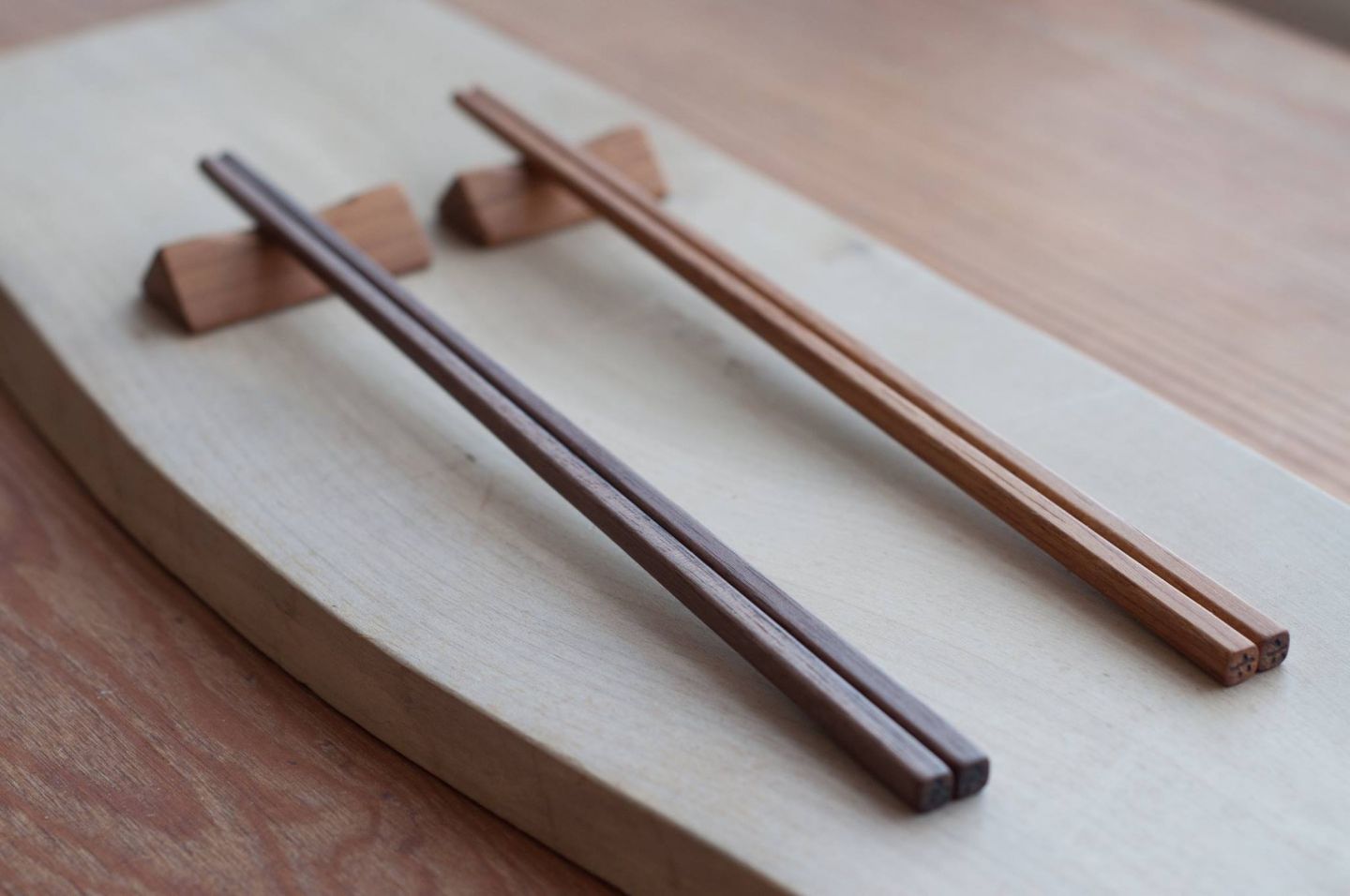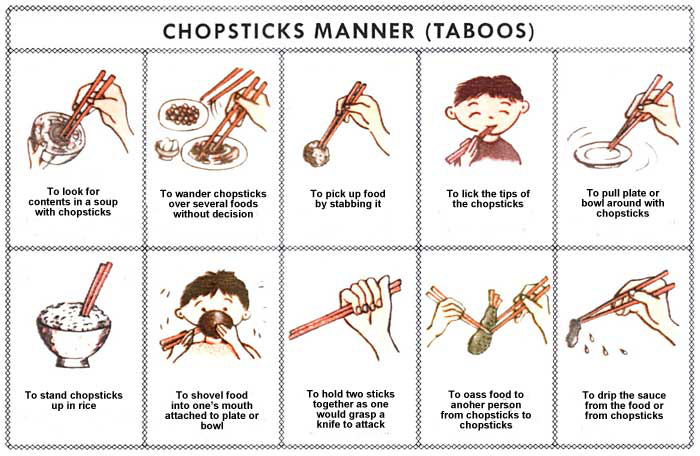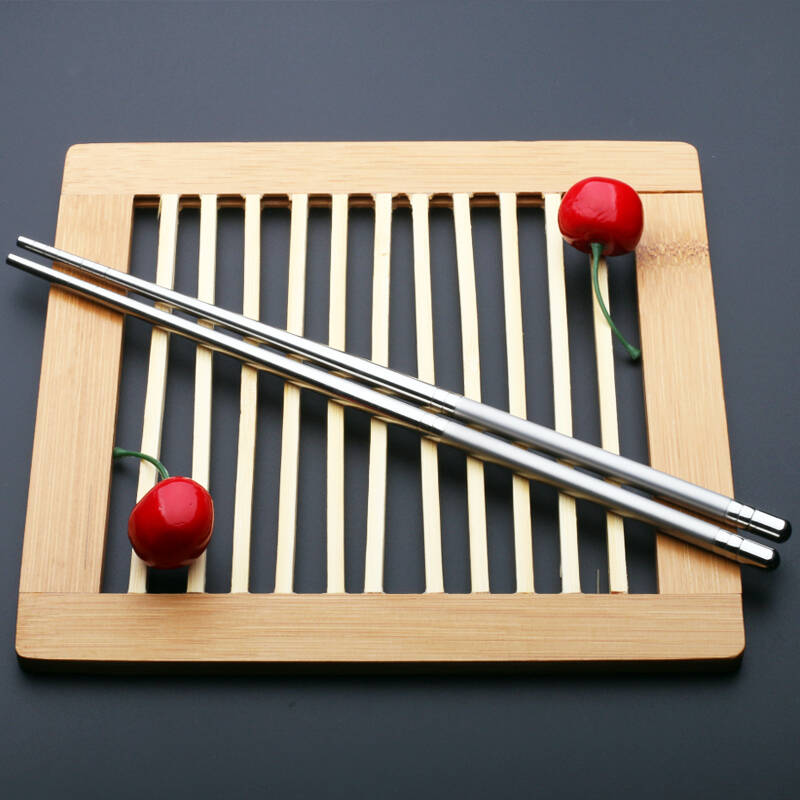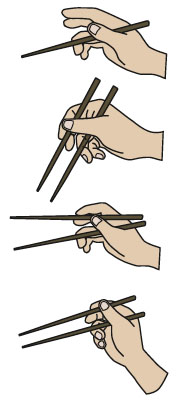Chopsticks, Kuaizi in Chinese, are small equal-length tapered sticks used for eating food in Asian countries. It plays an important role in Chinese people’s lives and bears many good wishes and cultural ideas.
History and Legends of Chinese Chopsticks
Chinese chopsticks have a long history that goes as far as to the Shang Dynasty. There is no unanimous conclusion about how chopsticks originated. The history chronicles suggested that King Zhou of the Shang Dynasty used the fine chopsticks made of ivory to eat. The earliest chopsticks were discovered in the tomb complex from the late Shang Dynasty in Anyang. Therefore, ivory chopsticks were already part of the tableware in 3100 years ago. King Zhou must not be the first person to use chopsticks.

Chopsticks and Dayu
Legend has it that the chopsticks were invented by Dayu, the father of the founder of the Xia Dynasty (the first dynasty in Chinese history). It’s said that Dayu invented chopsticks (two sticks actually) to pick up hot food to save time over a meal while doing the water control. Later, people followed his example and used chopsticks more commonly.
Chopsticks and Daji
The folktale of Daji inventing chopsticks is mainly popular in the Jiangsu area. It’s said that King Zhou of Shang was very meticulous about eating. He could always pick up some mistakes about the food and kill the chefs. Daji, the king's favored concubine, often tasted the food before they were presented to the king. One time, several delicacies were too hot to eat, and there was no time to replace them. As a last thought, Daji took down two of her long hairpins and used them to pick up food. She blew the food again and again so that the king wouldn’t be burnt. The king thought it was fun to be fed with chopsticks. Later, commons took the example and used chopsticks.
Chopsticks and Jiang Ziya
The tale is mainly famous in the Sichuan region. It’s said that Jiang Ziya was impoverished and useless when it came to laboring. His wife couldn’t bear to live with him anymore. She came up with an idea of poisoning him in order to remarry. So, she made a pot of meat for Jiang Ziya. However, whenever he tried to reach the meat with his hand, a bird always interrupted him. It turned out that the bird was not an ordinary bird. It was a divine bird sent by deities to prevent him from being poisoned. The bird told Jiang Ziya to use a pair of bamboo chopsticks to pick up the meat. When he did what he was told, blue smoke came out. Jiang Ziya understood now that the chopsticks were able to test all poisons. Since then, his neighbors began to use bamboo chopsticks as well.
The legend is obviously contradictory to the excavations made in the Shang Dynasty tombs. King Zhou in the Shang dynasty already used chopsticks, which made the Jiang Ziya’s invention less believable. Nevertheless, the tale tells us that the southern Chinese did use bamboo chopsticks in the Shang dynasty.
She came up with an idea of poisoning him in order to remarry. So, she made a pot of meat for Jiang Ziya. However, whenever he tried to reach the meat with his hand, a bird always interrupted him. It turned out that the bird was not an ordinary bird. It was a divine bird sent by deities to prevent him from being poisoned. The bird told Jiang Ziya to use a pair of bamboo chopsticks to pick up the meat. When he did what he was told, blue smoke came out. Jiang Ziya understood now that the chopsticks were able to test all poisons. Since then, his neighbors began to use bamboo chopsticks as well.
The legend is obviously contradictory to the excavations made in the Shang Dynasty tombs. King Zhou in the Shang dynasty already used chopsticks, which made the Jiang Ziya’s invention less believable. Nevertheless, the tale tells us that the southern Chinese did use bamboo chopsticks in the Shang dynasty.
Why do Chinese Use Chopsticks?
There are mainly three ways of eating in the world. Europeans and northern Americans use forks and knives. East Asian people mostly use chopsticks. South Asians, Africans, Middle East Asians, and Indonesians mainly use their hands to eat. Why is the difference?
Reason 1: In the early stage of world civilization, all humans used hands to eat. With the development of society and out of the cultural etiquette, different eating tools were created. From ancient times, Chinese people had cooked food. They don’t usually have raw food like other people. To cook food, the fire must be used. Therefore, to eat while the food is hot, eating tools became necessary. Meanwhile, Chinese people loved to boil food, and to stir food, a stick was required.
Reason 2: The history records tell us that Chinese people mainly used spoons to eat before the Qin Dynasty, and the food people had at that time were primarily thick soup made of millet. Later, wheat became popular in north China, and Chinese people began to have flour-made food. Chopsticks are a better choice when it comes to having cooked wheaten food. While in south China, where rice was often had together with dishes, it’s easier to pick up dishes with chopsticks.
Chopsticks Culture
Cultural significance of Chinese Chopsticks
Chinese chopsticks have two tips. The square end symbolizes the earth, and the round end symbolizes heaven, which corresponds with the Chinese people’s early understanding of the universe.  From the Yin and Yang perspective, the square end represents Yang, and the round end represents Yin. The upper square end of the chopsticks is the dominating party, and the lower part is the driven party, which also fits the philosophy idea of Yang being the dominating force in nature.
The standard length of the Chinese chopsticks is 7.6" (25.33cm), representing the seven emotions and six sensory pleasures of human beings. Therefore, chopsticks are used to warn people to restrain themselves from worldly desires.
The position of fingers on the chopsticks also implies the Chinese people’s understanding of the relationship between human beings and the world. When we use the chopsticks, our thumb and index finger are on the top, the middle finger is in the middle, and the ring finger and the little finger are at the bottom. The three positions also represent heaven, earth, and people.
From the Yin and Yang perspective, the square end represents Yang, and the round end represents Yin. The upper square end of the chopsticks is the dominating party, and the lower part is the driven party, which also fits the philosophy idea of Yang being the dominating force in nature.
The standard length of the Chinese chopsticks is 7.6" (25.33cm), representing the seven emotions and six sensory pleasures of human beings. Therefore, chopsticks are used to warn people to restrain themselves from worldly desires.
The position of fingers on the chopsticks also implies the Chinese people’s understanding of the relationship between human beings and the world. When we use the chopsticks, our thumb and index finger are on the top, the middle finger is in the middle, and the ring finger and the little finger are at the bottom. The three positions also represent heaven, earth, and people.
There is a Chinese saying that one chopstick is easy to break, but a pair of chopsticks or chopsticks is not. Therefore, Chinese people often hold dear about the idea of unity. It’s the idea that holds Chinese people together at critical times.
 10 Taboos of Chopsticks
10 Taboos of Chopsticks
1.Place chopsticks unevenly in length on the table. Chinese people deem such behavior an ominous omen.
2.Grip the chopsticks with your thumb, middle finger, ring finger, and little finger, yet with the index finger stretching out. Point somebody with your index finger often means you are censuring that person. Therefore, stretching your index finger toward other people is offensive as well.
3.Put chopsticks in your mouth and make noise. It's deemed as ungracious.  4.Tap bowls or plates with chopsticks. In old China, only beggars would behave like this to raise the attention of passengers.
5.Wander chopsticks over the dishes and unable to decide which dish to have.
6.Stir food with your private chopsticks to find what you like to have.
7.Pour soup or drop food on the table.
8.Stick one chopstick into the food. It’s like giving a middle finger to people at the table.
9.Stick chopsticks vertically into the dishes. In China, chopsticks are only put vertically in the dishes for dead people.
10.Invert your chopsticks, for example, use them the wrong way around.
4.Tap bowls or plates with chopsticks. In old China, only beggars would behave like this to raise the attention of passengers.
5.Wander chopsticks over the dishes and unable to decide which dish to have.
6.Stir food with your private chopsticks to find what you like to have.
7.Pour soup or drop food on the table.
8.Stick one chopstick into the food. It’s like giving a middle finger to people at the table.
9.Stick chopsticks vertically into the dishes. In China, chopsticks are only put vertically in the dishes for dead people.
10.Invert your chopsticks, for example, use them the wrong way around.
Chopsticks and Wedding Customs
Chopsticks are the auspicious objects during the Chinese wedding. As the essential tableware in China, chopsticks are also used to reference the person using the chopsticks. If a Chinese says, please add a pair of chopsticks, which means there will be one more person joining the meal. Therefore, adding chopsticks on the table became a ritual of adding new members to the group. Besides, the pronunciation of chopsticks, Kuai Zi, resembles that of two other words “soon (kuai)” and “son (zi).” Therefore, Chinese people often give chopsticks to the newlyweds in the hope of them having babies soon.
Chopsticks Materials
1.Bamboo Chopsticks 
Bamboo chopsticks are mainly used in southern China, as bamboos are the commonest material there. They are light, poor in thermal conductance, and convenient to use. Besides, bamboos have a smooth facade and short growth cycle, which makes it to germinate bacterium.
2.Wooden Chopsticks
Wooden chopsticks are mostly made of natural woods, like rosewood, nanmu, jujube wood, and wintergreen. Chopsticks made of different wood can give you a different eating experience. They are also light and convenient to use. However, wooden chopsticks are prone to be eroded by bacteria. Therefore, wooden chopsticks must be changed every few months.
3.Metal Chopsticks
In old China, metal chopsticks, particularly the metal chopsticks, are the tokens of status. Only imperials members were allowed and able to use such chopsticks. To ensure the  food's safety, silver chopsticks were often used by royals to test the food and eat. Today, the metal chopsticks mainly refer to the chopsticks made of stainless steel.
food's safety, silver chopsticks were often used by royals to test the food and eat. Today, the metal chopsticks mainly refer to the chopsticks made of stainless steel.
4.Plastic Chopsticks
Plastic chopsticks are easy to carry and beautiful in color. However, plastics have a low melting point, making plastic chopsticks prone to deform and release detrimental matters. Besides, plastic chopsticks are easy to breed bacteria.
How to Use Chopsticks?
Step 1: Prepare a pair of chopsticks; bamboo chopsticks are preferred.  Step 2: Pick up the first chopstick with your thumb and middle finger and keep the chopsticks steady. Lay the broad end of the chopstick on the crook part of your thumb and index finger. Rest the narrow end of the chopstick in the middle of the tips of your ring finger and middle finger. It’s like holding a pen, but lower.
Step 3: Get the second chopstick with your index finger and put your thumb over the second chopstick (with the first finger held steady). Adjust your grip until it’s most comfortable for you. Make sure the narrow ends of the chopsticks are even, so it’s easier for you to pinch the food. You can tap the narrow ends of your chopsticks on the table so they can be even.
Step 4: Practice opening and closing the chopsticks. Make sure the broad end of the chopsticks does not make an “X” shape. Some people like to hold the chopsticks higher, and some like lower. No matter what position you want, just be comfortable.
Step 5: Pick up the food at a right angle (45 degrees). Once the food is picked up, slowly draw it near your mouth. If the chopsticks are unstable, try again.
Step 2: Pick up the first chopstick with your thumb and middle finger and keep the chopsticks steady. Lay the broad end of the chopstick on the crook part of your thumb and index finger. Rest the narrow end of the chopstick in the middle of the tips of your ring finger and middle finger. It’s like holding a pen, but lower.
Step 3: Get the second chopstick with your index finger and put your thumb over the second chopstick (with the first finger held steady). Adjust your grip until it’s most comfortable for you. Make sure the narrow ends of the chopsticks are even, so it’s easier for you to pinch the food. You can tap the narrow ends of your chopsticks on the table so they can be even.
Step 4: Practice opening and closing the chopsticks. Make sure the broad end of the chopsticks does not make an “X” shape. Some people like to hold the chopsticks higher, and some like lower. No matter what position you want, just be comfortable.
Step 5: Pick up the food at a right angle (45 degrees). Once the food is picked up, slowly draw it near your mouth. If the chopsticks are unstable, try again.
Benefits of Using Chopsticks
1. Strengthen the coordinating ability of the hand
When you use chopsticks to pick up food, you are not just moving the five fingers, your shoulder and elbow joints are also used. In fact, Japanese scientists found out that using chopsticks involves over 50 muscles of your body. Therefore, it's a great opportunity to exercise practice the hands-on skills of your children.
2. Promote visual development
Before picking up the food with your chopsticks, you have to focus your eyes on the objects, which is conducive to your eyesight. Besides, many Chinese dishes involve sliced or diced food, which is a great practice for your concentration.
3.Improve Intelligence
Using chopsticks requires the coordination of your eyes and hands, which depends on the adjustment and correction of your brain's neural reflexes. Therefore, more use of chopsticks is good for your intelligence improvement.
Who Use Chopsticks?
Countries that use chopsticks as a daily tool include China, North Korea, Southe Korea, Japan, Vietnam, Mongolia, Singapore, and Malaysia. In China, chopsticks are not just a tool for eating, and they have many meanings. With China becoming famous in old times, the Chinese chopsticks were also introduced to the neighboring countries. This is why countries also using chopsticks are mostly Asian states. Later, numerous Chinese people migrated to western countries and brought the eating habits with them. Therefore, many foreigners can use chopsticks as well.
Experience Chinese Chopsticks Culture with Lilysun China Tours: 14 Days China Cooking and Foodie Tour

 She came up with an idea of poisoning him in order to remarry. So, she made a pot of meat for Jiang Ziya. However, whenever he tried to reach the meat with his hand, a bird always interrupted him. It turned out that the bird was not an ordinary bird. It was a divine bird sent by deities to prevent him from being poisoned. The bird told Jiang Ziya to use a pair of bamboo chopsticks to pick up the meat. When he did what he was told, blue smoke came out. Jiang Ziya understood now that the chopsticks were able to test all poisons. Since then, his neighbors began to use bamboo chopsticks as well.
She came up with an idea of poisoning him in order to remarry. So, she made a pot of meat for Jiang Ziya. However, whenever he tried to reach the meat with his hand, a bird always interrupted him. It turned out that the bird was not an ordinary bird. It was a divine bird sent by deities to prevent him from being poisoned. The bird told Jiang Ziya to use a pair of bamboo chopsticks to pick up the meat. When he did what he was told, blue smoke came out. Jiang Ziya understood now that the chopsticks were able to test all poisons. Since then, his neighbors began to use bamboo chopsticks as well. 
 10 Taboos of Chopsticks
10 Taboos of Chopsticks


 food's safety, silver chopsticks were often used by royals to test the food and eat. Today, the metal chopsticks mainly refer to the chopsticks made of stainless steel.
food's safety, silver chopsticks were often used by royals to test the food and eat. Today, the metal chopsticks mainly refer to the chopsticks made of stainless steel. 